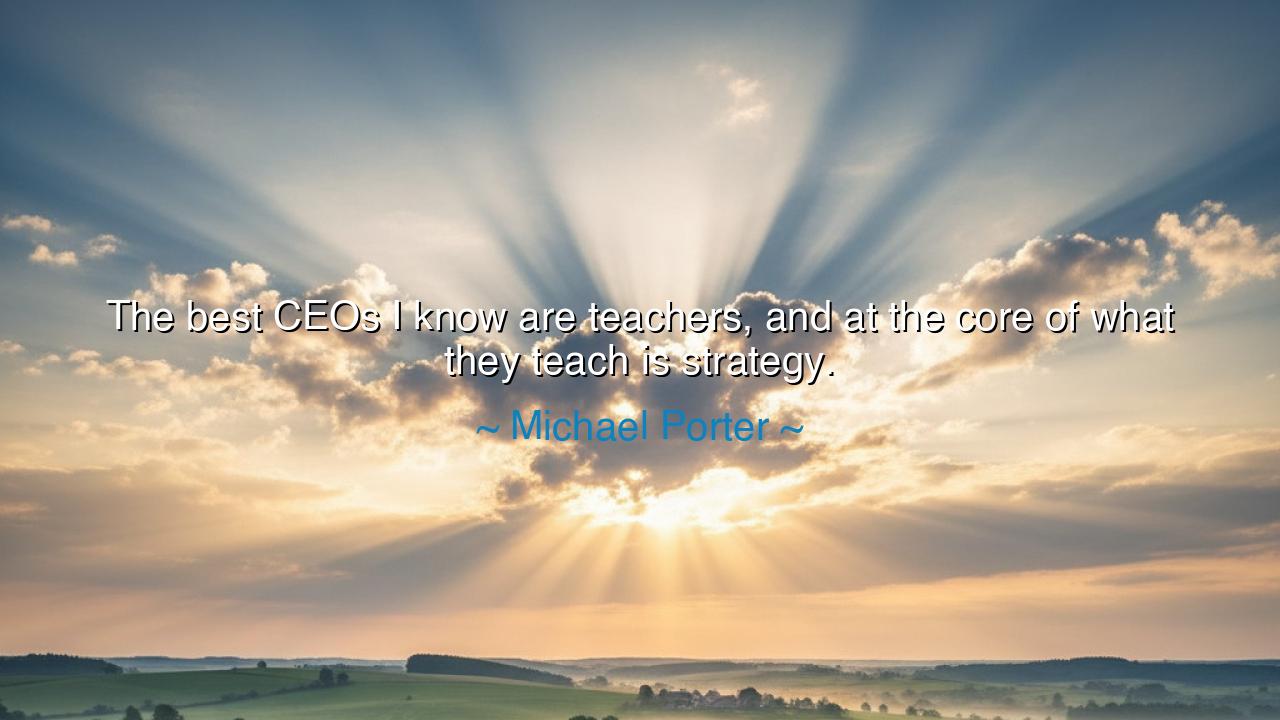
The best CEOs I know are teachers, and at the core of what they






Hear, O seeker of wisdom, the words of Michael Porter, master of enterprise and architect of competitive thought: “The best CEOs I know are teachers, and at the core of what they teach is strategy.” This truth is not only for the rulers of corporations, but for all who would guide others. For what is leadership if not the art of teaching? And what is the heart of teaching, if not the unveiling of a path—a strategy—that turns confusion into clarity, and struggle into triumph?
The origin of these words lies in Porter’s lifelong study of commerce and competition. He beheld not merely the clash of markets, but the deeper law that governs success: that vision without instruction dies, and plans without teaching falter. A CEO, no matter how brilliant, is but one mind. Yet a teacher multiplies wisdom, casting it like seed into the hearts of many. Thus, the leader who teaches strategy empowers others to think, to act, to build—not as blind followers, but as wise warriors in a shared cause.
Look to the story of Alfred Sloan, who guided General Motors through its golden age. He was not merely an executive who signed decrees; he was a teacher who explained to his managers the logic of decentralization, the balance of autonomy and unity. By teaching his strategy rather than hoarding it, Sloan raised up leaders beneath him who could think as he thought, decide as he would decide, and act with foresight. His company endured not because he ruled, but because he taught.
The ancients, too, understood this principle. Alexander of Macedon conquered half the known world, yet even he declared that while his father gave him life, it was Aristotle, his teacher, who gave him the art of ruling. What did Aristotle impart but strategy—the wisdom to understand men, cities, and empires? Thus, the king was great because the philosopher was greater, and leadership was born not from command alone, but from the act of teaching.
The meaning of Porter’s words, then, is both heroic and humbling. The CEO who merely commands is a tyrant, and his power dies when he falls. But the CEO who teaches creates disciples of vision, bearers of wisdom, architects of the future. His strength is not in his throne, but in the minds he awakens. The greatest legacy of a leader is not the wealth amassed, but the strategy instilled in others, so that long after his voice is silent, his people continue to prosper.
From this flows a lesson for all: whether you lead a company, a household, a classroom, or a team, you must be a teacher. Do not simply tell others what to do; reveal to them why the path matters, how the steps connect, where the destination lies. Share the strategy, not just the orders. For in teaching, you plant seeds of strength that no storm can uproot.
Practical steps are clear. Speak often not only of tasks, but of principles. Invite others to question, so they may understand rather than obey blindly. When you decide, explain your strategy, that others may learn to think with the same vision. Do not hoard wisdom, but scatter it like seed. In this way, you transform followers into leaders, and a fragile enterprise into a living force that endures beyond you.
Thus, remember Porter’s teaching: “The best CEOs are teachers, and at the core of what they teach is strategy.” Live as one who does not merely rule, but enlightens; not merely commands, but instructs. In so doing, you will lead not for a day, but for generations, and your name will be spoken not as that of a master, but as that of a builder of builders.






AAdministratorAdministrator
Welcome, honored guests. Please leave a comment, we will respond soon